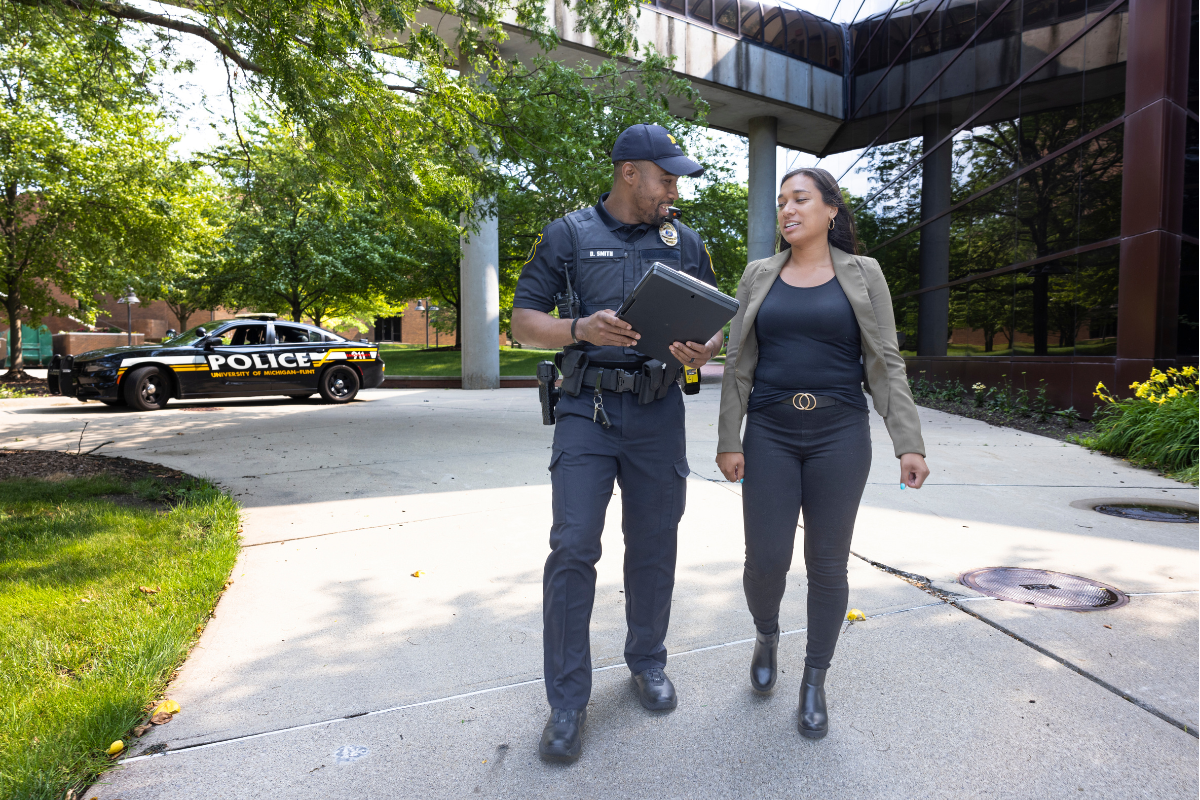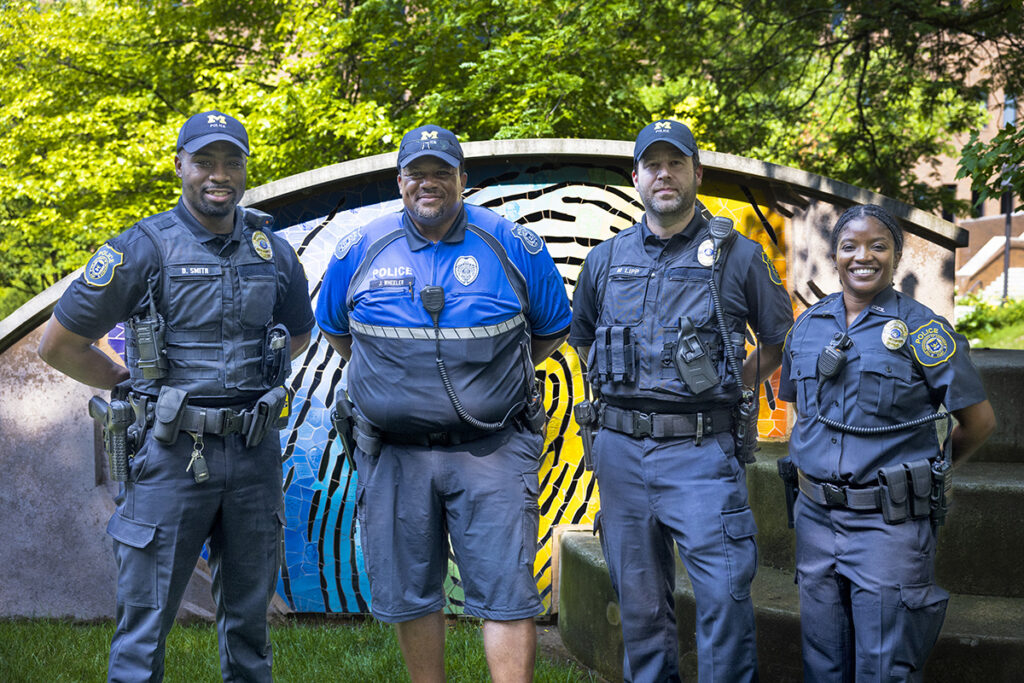UM-Flint police officers receive social work instruction for handling mental health situations

Courtesy of an initiative to foster stronger connections between law enforcement and the community, the University of Michigan-Flint Department of Public Safety has partnered with Genesee Health System to receive specialized training in mental health de-escalation techniques. The innovative program will equip DPS police officers with the skills and knowledge to effectively address complex social issues and enhance their ability to engage with diverse communities.
Five DPS officers – Alexis Frierson, Mitch Lipp, Torrey Ruffin, Deon Smith and James Wheeler – are involved in the process and will comprise a new unit within DPS known as the Crisis Intervention Team.
"We realize that our office and police throughout Genesee County often see the same people every single day," said Kailey Baker, crisis intervention team supervisor at Genesee Health System. "Through the training that is provided to local law enforcement agencies across the county by our office, we can better deal with the needs of those we serve and level up the care they receive by equipping the police with the knowledge to approach certain situations with a level of understanding that they may not have had access to before."

Recognizing the constantly evolving role of police officers within the campus community, the program will help create a more compassionate and holistic approach to public safety. The collaborative effort between DPS and GHS marks a significant step forward in redefining the traditional methods of policing.
"Crisis intervention strategies not only prevent crimes and make the community safer but also provide moral imperatives that guide us to support those in a life crisis," said Ray Hall, DPS director. "We recognize that as a progressive department committed to problem-oriented policing strategies, we must be fully dedicated to supporting our community members and neighbors in crisis. As such, our standard should not be just to meet the expectations of our community members but to exceed them. Training our officers in social work allows us to do that."
The 40-hour training program, developed by GHS, encompasses various topics to enhance officers' understanding of social dynamics and human behavior. It provides them with essential tools to identify underlying social issues, build trust, and communicate effectively with individuals and communities they encounter on duty.
The curriculum integrates practical exercises, case studies, and role-playing scenarios to simulate real-world encounters that officers may face during patrols. The program aims to enhance officers' ability to de-escalate conflicts, defuse tense situations, and employ appropriate interventions that prioritize community welfare and safety by immersing officers in these simulated situations.
"When we launched this training initiative two years ago, I began going on ride-alongs with as many police departments as I could, and if I had been in their shoes, I would have been incredibly anxious to go out on calls that I had not been properly trained for, and that is in no way their fault as mental health training isn't something they cover in the academy," said Baker.
"What we're doing through this program is just as much a service for the officers as it is for the community members, and it increases the safety for both parties. If we can spot mental health issues immediately and respond to them differently, more effectively than a typical call, we'll likely have better and safer outcomes. I share that with the officers who participate in the training. To me, social work and law enforcement are great collaborators who can benefit everyone involved."
Smith, who joined DPS following 10 years with the Office of the Genesee County Sheriff, feels the creation of the Crisis Intervention Team provides a unique opportunity for UM-Flint officers to be more involved with those they serve and provides them with another valuable tool to use when encountering a crisis.
"Taking part in this training and being a part of this team does change your approach to the job," said Smith. "My grandfather always told me, 'Seek to understand in order to be understood.' For me, that means that we, as law enforcement, need to take a step back to see the whole picture, to recognize the symptoms and behaviors that someone is exhibiting and the way they are speaking and how they are articulating the situation to us. Taking that approach allows us to pinpoint if the person we're interacting with is experiencing a mental health crisis. (Having participated in this training) allows us to be more proactive in our approach while showing more humility to the people and meet them where they're at."
Both Baker and Smith shared that the training the officers have participated in has led some of them onto a journey of self-discovery.
"I'm not only a police officer, but I'm also a husband, a father, and a son," said Smith. "And there are so many factors that play into all of that. Sometimes you sense that it can be too much and that everything is getting difficult. As you recognize that, you say to yourself, 'Okay, hold on one second.'
"And it's not that you're not able to get a handle on things; it's simply that you're human and need some help, whether that's seeking out a professional to speak with, bringing in your religion or whatever you need to cope, there is nothing wrong with asking for and seeking out help. As someone dedicated to serving and protecting, I need to stay sharp, and the only way for me to do that is to ensure I'm looking after myself and my mental health."
Hall said the training program and subsequent formation of the intervention team represents a significant leap forward in the ongoing efforts of the DPS to improve community policing. "By incorporating social work tactics, our officers will be better equipped to address the root causes of social issues and work collaboratively with community members to find long-lasting solutions," he said.
"The university's commitment to providing social work training for its officers demonstrates its dedication to promoting dialogue, empathy, and understanding. Through this collaborative effort, our department is taking additional steps to build community bridges and address today's complex challenges."
Related Posts
No related photos.
Robb King
Robb King is the director of marketing and communications at UM-Flint. He can be reached at [email protected].